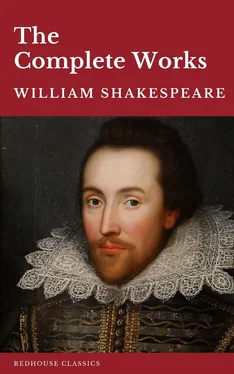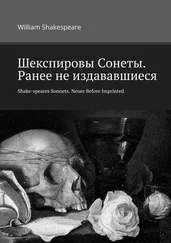Than whom no mortal so magnificent!
This wimpled, whining, purblind, wayward boy,
This senior[-junior], giant-dwarf, Dan Cupid,
Regent of love-rhymes, lord of folded arms,
Th’ anointed sovereign of sighs and groans,
Liege of all loiterers and malecontents,
Dread prince of plackets, king of codpieces,
Sole imperator and great general
Of trotting paritors (O my little heart!),
And I to be a corporal of his field,
And wear his colors like a tumbler’s hoop!
What! I love, I sue, I seek a wife—
A woman, that is like a German [clock],
Still a-repairing, ever out of frame,
And never going aright, being a watch,
But being watch’d that it may still go right!
Nay, to be perjur’d, which is worst of all;
And among three to love the worst of all,
A whitely wanton with a velvet brow,
With two pitch-balls stuck in her face for eyes;
Ay, and, by heaven, one that will do the deed
Though Argus were her eunuch and her guard.
And I to sigh for her, to watch for her,
To pray for her, go to! It is a plague
That Cupid will impose for my neglect
Of his almighty dreadful little might.
Well, I will love, write, sigh, pray, sue, groan:
Some men must love my lady, and some Joan.
[Exit.]
¶
Enter the Princess, a Forester, her Ladies [Rosaline, Maria, Katherine], and her Lords, [among them Boyet].
Prin.
Was that the King that spurr’d his horse so hard
Against the steep-up rising of the hill?
For.
I know not, but I think it was not he.
Prin.
Whoe’er ’a was, ’a show’d a mounting mind.
Well, lords, to-day we shall have our dispatch;
[On] Saturday we will return to France.
Then, forester, my friend, where is the bush
That we must stand and play the murtherer in?
For.
Hereby, upon the edge of yonder coppice,
A stand where you may make the fairest shoot.
Prin.
I thank my beauty, I am fair that shoot,
And thereupon thou speak’st the fairest shoot.
For.
Pardon me, madam, for I meant not so.
Prin.
What, what? First praise me, and again say no?
O short-liv’d pride! Not fair? alack for woe!
For.
Yes, madam, fair.
Prin.
Nay, never paint me now;
Where fair is not, praise cannot mend the brow.
Here (good my glass), take this for telling true:
[Giving him money.]
Fair payment for foul words is more than due.
For.
Nothing but fair is that which you inherit.
Prin.
See, see, my beauty will be sav’d by merit.
O heresy in fair, fit for these days!
A giving hand, though foul, shall have fair praise.
But come, the bow: now mercy goes to kill,
And shooting well is then accounted ill.
Thus will I save my credit in the shoot:
Not wounding, pity would not let me do’t;
If wounding, then it was to show my skill,
That more for praise than purpose meant to kill.
And out of question so it is sometimes:
Glory grows guilty of detested crimes,
When for fame’s sake, for praise, an outward part,
We bend to that the working of the heart;
As I for praise alone now seek to spill
The poor deer’s blood, that my heart means no ill.
Boyet.
Do not curst wives hold that self-sovereignty
Only for praise’ sake, when they strive to be
Lords o’er their lords?
Prin.
Only for praise—and praise we may afford
To any lady that subdues a lord.
Enter Clown [Costard].
Boyet.
Here comes a member of the commonwealth.
Cost.
God dig-you-den all! Pray you, which is the head lady?
Prin.
Thou shalt know her, fellow, by the rest that have no heads.
Cost.
Which is the greatest lady, the highest?
Prin.
The thickest and the tallest.
Cost.
The thickest and the tallest! it is so, truth is truth.
And your waist, mistress, were as slender as my wit,
One a’ these maids’ girdles for your waist should be fit.
Are not you the chief woman? You are the thickest here.
Prin.
What’s your will, sir? what’s your will?
Cost.
I have a letter from Monsieur Berowne to one Lady Rosaline.
Prin.
O, thy letter, thy letter! He’s a good friend of mine.
Stand aside, good bearer. Boyet, you can carve,
Break up this capon.
Boyet.
I am bound to serve.
This letter is mistook; it importeth none here.
It is writ to Jaquenetta.
Prin.
We will read it, I swear.
Break the neck of the wax, and every one give ear.
Boyet reads. “By heaven, that thou art fair, is most infallible; true, that thou art beauteous; truth itself, that thou art lovely. More fairer than fair, beautiful than beauteous, truer than truth itself, have commiseration on thy heroical vassal! The magnanimous and most illustrate King Cophetua set eye upon the pernicious and indubitate beggar Zenelophon; and he it was that might rightly say, Veni, vidi, vici; which to annothanize in the vulgar—O base and obscure vulgar!—videlicet, He came, [saw], and overcame: he came, one; [saw], two; [overcame], three. Who came? the king. Why did he come? to see. Why did he see? to overcome. To whom came he? to the beggar. What saw he? the beggar. Who overcame he? the beggar. The conclusion is victory; on whose side? the [king’s]. The captive is enrich’d; on whose side? the beggar’s. The catastrophe is a nuptial; on whose side? the king’s; no, on both in one, or one in both. I am the king, for so stands the comparison; thou the beggar, for so witnesseth thy lowliness. Shall I command thy love? I may. Shall I enforce thy love? I could. Shall I entreat thy love? I will. What shalt thou exchange for rags? robes; for tittles? titles; for thyself? me. Thus expecting thy reply, I profane my lips on thy foot, my eyes on thy picture, and my heart on thy every part. Thine, in the dearest design of industry,
Don Adriano de Armado.
Thus dost thou hear the Nemean lion roar
’Gainst thee, thou lamb, that standest as his prey;
Submissive fall his princely feet before,
And he from forage will incline to play.
But if thou strive, poor soul, what art thou then?
Food for his rage, repasture for his den.”
Prin.
What plume of feathers is he that indited this letter?
What vane? What weathercock? Did you ever hear better?
Boyet.
I am much deceived but I remember the style.
Prin.
Else your memory is bad, going o’er it ere-while.
Boyet.
This Armado is a Spaniard that keeps here in court,
A phantasime, a Monarcho, and one that makes sport
To the Prince and his book-mates.
Prin.
Thou fellow, a word.
Who gave thee this letter?
Cost.
I told you: my lord.
Prin.
To whom shouldst thou give it?
Cost.
From my lord to my lady.
Prin.
From which lord to which lady?
Cost.
From my Lord Berowne, a good master of mine,
To a lady of France that he call’d Rosaline.
Prin.
Thou hast mistaken his letter. Come, lords, away.
[To Rosaline.]
Here, sweet, put up this—’twill be thine another day.
[Exeunt Princess and Train.]
Boyet.
Who is the shooter? Who is the shooter?
Читать дальше












